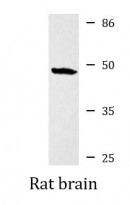ARG54101
anti-CKMT2 antibody
anti-CKMT2 antibody for Western blot and Rat
Controls and Markers antibody; Metabolism antibody; Signaling Transduction antibody
Overview
| Product Description | Mouse Monoclonal antibody recognizes CKMT2 |
|---|---|
| Tested Reactivity | Rat |
| Tested Application | WB |
| Host | Mouse |
| Clonality | Monoclonal |
| Isotype | IgG2b |
| Target Name | CKMT2 |
| Antigen Species | Human |
| Immunogen | Purified recombinant human CKMT2 protein fragments expressed in E.coli. |
| Conjugation | Un-conjugated |
| Alternate Names | EC 2.7.3.2; S-MtCK; Basic-type mitochondrial creatine kinase; Creatine kinase S-type, mitochondrial; Mib-CK; Sarcomeric mitochondrial creatine kinase; SMTCK |
Application Instructions
| Application Suggestion |
|
||||
|---|---|---|---|---|---|
| Application Note | * The dilutions indicate recommended starting dilutions and the optimal dilutions or concentrations should be determined by the scientist. | ||||
| Observed Size | 47 kDa |
Properties
| Form | Liquid |
|---|---|
| Purification | Affinity purified |
| Buffer | 0.1M Tris-Glycine (pH 7.4), 150 mM NaCl, 0.2% Sodium azide and 50% Glycerol |
| Preservative | 0.2% Sodium azide |
| Stabilizer | 50% Glycerol |
| Concentration | 1 mg/ml |
| Storage Instruction | For continuous use, store undiluted antibody at 2-8°C for up to a week. For long-term storage, aliquot and store at -20°C. Storage in frost free freezers is not recommended. Avoid repeated freeze/thaw cycles. Suggest spin the vial prior to opening. The antibody solution should be gently mixed before use. |
| Note | For laboratory research only, not for drug, diagnostic or other use. |
Bioinformation
| Gene Symbol | CKMT2 |
|---|---|
| Gene Full Name | creatine kinase, mitochondrial 2 (sarcomeric) |
| Background | Reversibly catalyzes the transfer of phosphate between ATP and various phosphogens (e.g. creatine phosphate). Creatine kinase isoenzymes play a central role in energy transduction in tissues with large, fluctuating energy demands, such as skeletal muscle, heart, brain and spermatozoa. |
| Function | Reversibly catalyzes the transfer of phosphate between ATP and various phosphogens (e.g. creatine phosphate). Creatine kinase isoenzymes play a central role in energy transduction in tissues with large, fluctuating energy demands, such as skeletal muscle, heart, brain and spermatozoa. [UniProt] |
| Cellular Localization | Mitochondrion inner membrane; Peripheral membrane protein; Intermembrane side. |
| Research Area | Controls and Markers antibody; Metabolism antibody; Signaling Transduction antibody |
| Calculated MW | 48 kDa |
Images (1) Click the Picture to Zoom In






